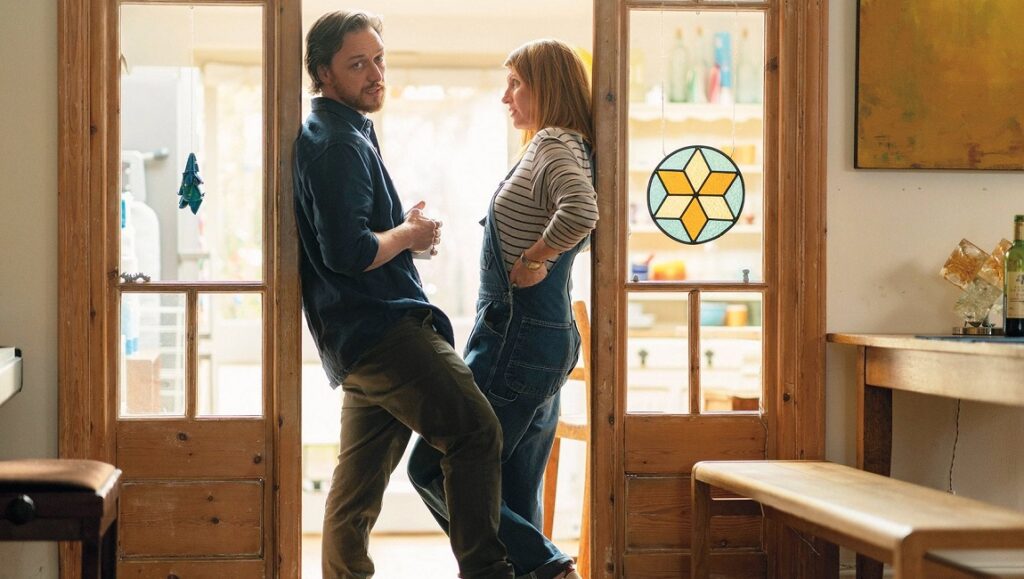Together is an endurance test for viewers and a self-satisfied pat on the back from the filmmakers.
Stephen Daldry has become a bit of a punching bag over the years, for reasons both understandable and absurd. The West End theater director and filmmaker received Oscar nominations for his first three features: Billy Elliot, The Hours, and The Reader. While none of these films are outright bad, they are precisely the kind of Oscar bait flicks that, were they made today, would be regarded more as meme than movie. It doesn’t help that Daldry has no discernible directorial style to speak of, his formal contributions as nondescript as the scripts themselves; his signature is bland and workmanlike, making him a suitable enough poster child for everything wrong with the awards circuit as a whole. That he’s mastered such a broken system makes him an easy target, which is fair, but it also evinces a shrewdness that doesn’t get enough respect. Fairly or not, however, Daldry’s career effectively went off a cliff after Extremely Loud and Incredibly Close — which, also fair — and he hasn’t made a film since 2014’s Trash, which was his first film not to receive any sort of rewards recognition. The question, then, is will his latest feature, Together, mark his triumphant return to the good graces of Oscar? It’s not like anyone actually cares about the Academy Awards, but still, we have to hope not.
The umpteenth COVID/quarantine film to limp its way into the marketplace, Together comes from the pen of playwright Dennis Kelly, and it’s nothing if not a theater production awkwardly shoehorned into the medium of film, even though it was written specifically for the screen. Let me explain: James McAvoy and Sharon Horgan star as an unnamed couple who are forced to spend quarantine together even though their love for one another faded years before. Faded is actually an understatement, as the two outright hate one another, explicating their disgust in long-winded diatribes, but they have stayed together for the sake of their son, because sure, that always works out. Together follows the couple for one year, from the first day of the UK lockdown to exactly 12 months later, as their relationship evolves in the most predictable ways possible, while their son Artie watches silently in the wings. The deeper problem, however, isn’t the film’s adherence to formula or theater trappings, but rather that the central couple is insufferable to spend time with, their endless slanders against one another becoming an endurance test for viewers. Together breaks the cardinal rule of romantic dramas in that it fails to understand that these two people aren’t meant for one another so much as they deserve one another, which makes for a truly grating viewing experience. This is essentially a two-hander set in a single location, yet Daldry and Kelly make the curious decision to have his couple break the fourth wall and address the audience, making the viewer an unwilling participant in their incessant bickering — cool decision, because if there’s one thing all people can agree on, it’s that we love to be dragged into others’ arguments.
It’s certainly a confounding decision, that is until the true intent of Together is finally revealed: this is not a relationship drama so much as a piece of agitprop, a rage-fueled polemic against a government that did nothing in the way of ensuring its citizens’ safety. To that end, the rage expressed is certainly earned, and even manages to be cathartic at times, but it’s presented in the most blasé way possible, with McAvoy and Horgan forced to recite statistics and wax on the true definition of the word “exponential” directly to the camera, leaving viewers nothing to do but clutch their pearls. The information being detailed isn’t nearly as revelatory as the filmmakers seem to think it is, which undermines the whole hubristic exercise, as does the fact that it’s all being delivered by a bunch of privileged white people residing in a gorgeous house. Watching McAvoy summon tears while delivering a five-minute monologue about essential workers is…something. And all of this topical politicizing also gets in the way of the central storyline, as large sections of the film barely address the ever-changing relationship ostensibly at its core. McAvoy and Horgan are pros, certainly likeable enough performers to pull off such a production, so it’s confusing why the decision was made to make them both so disagreeable in this actorly exercise of whining and screaming. Daldry, par for the course, does nothing of visual interest, save for a few dolly zoom-ins that feel approximately as obvious as everything else here. Together will certainly not be the last Covid-related production, but after the almost two years we’ve all endured, why bother with this content at all if this is the best you can muster?


Comments are closed.